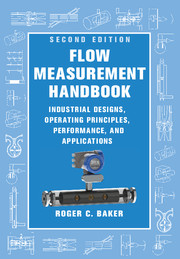Refine search
Actions for selected content:
5487 results in Thermal-fluids engineering
10 - Turbulent flow
- from Part III - Microscopic analysis
-
- Book:
- Introduction to Chemical Engineering Fluid Mechanics
- Published online:
- 28 May 2018
- Print publication:
- 15 August 2016, pp 261-288
-
- Chapter
- Export citation
5 - Fluid kinematics
- from Part II - Fundamentals of fluid dynamics
-
- Book:
- Introduction to Chemical Engineering Fluid Mechanics
- Published online:
- 28 May 2018
- Print publication:
- 15 August 2016, pp 110-129
-
- Chapter
- Export citation
Part III - Microscopic analysis
-
- Book:
- Introduction to Chemical Engineering Fluid Mechanics
- Published online:
- 28 May 2018
- Print publication:
- 15 August 2016, pp 159-160
-
- Chapter
- Export citation
Part I - Use of experimental data
-
- Book:
- Introduction to Chemical Engineering Fluid Mechanics
- Published online:
- 28 May 2018
- Print publication:
- 15 August 2016, pp 1-2
-
- Chapter
- Export citation
3 - Drag, particles, and porous media
- from Part I - Use of experimental data
-
- Book:
- Introduction to Chemical Engineering Fluid Mechanics
- Published online:
- 28 May 2018
- Print publication:
- 15 August 2016, pp 54-82
-
- Chapter
- Export citation
11 - Macroscopic balances for mass, momentum, and energy
- from Part IV - Macroscopic analysis
-
- Book:
- Introduction to Chemical Engineering Fluid Mechanics
- Published online:
- 28 May 2018
- Print publication:
- 15 August 2016, pp 291-321
-
- Chapter
- Export citation
Preface
-
-
- Book:
- Introduction to Chemical Engineering Fluid Mechanics
- Published online:
- 28 May 2018
- Print publication:
- 15 August 2016, pp xxi-xxiii
-
- Chapter
- Export citation
6 - Stress and momentum
- from Part II - Fundamentals of fluid dynamics
-
- Book:
- Introduction to Chemical Engineering Fluid Mechanics
- Published online:
- 28 May 2018
- Print publication:
- 15 August 2016, pp 130-158
-
- Chapter
- Export citation
Dedication
-
- Book:
- Introduction to Chemical Engineering Fluid Mechanics
- Published online:
- 28 May 2018
- Print publication:
- 15 August 2016, pp vii-viii
-
- Chapter
- Export citation
Frontmatter
-
- Book:
- Introduction to Chemical Engineering Fluid Mechanics
- Published online:
- 28 May 2018
- Print publication:
- 15 August 2016, pp i-vi
-
- Chapter
- Export citation
Part II - Fundamentals of fluid dynamics
-
- Book:
- Introduction to Chemical Engineering Fluid Mechanics
- Published online:
- 28 May 2018
- Print publication:
- 15 August 2016, pp 83-84
-
- Chapter
- Export citation
List of symbols
-
- Book:
- Introduction to Chemical Engineering Fluid Mechanics
- Published online:
- 28 May 2018
- Print publication:
- 15 August 2016, pp xxiv-xxvi
-
- Chapter
- Export citation

Combustion Waves and Fronts in Flows
- Flames, Shocks, Detonations, Ablation Fronts and Explosion of Stars
-
- Published online:
- 05 August 2016
- Print publication:
- 28 July 2016

Flow Measurement Handbook
- Industrial Designs, Operating Principles, Performance, and Applications
-
- Published online:
- 05 August 2016
- Print publication:
- 25 August 2016
1 - General Considerations
- from Part One - Physical Insights
-
- Book:
- Combustion Waves and Fronts in Flows
- Published online:
- 05 August 2016
- Print publication:
- 28 July 2016, pp 13-44
-
- Chapter
- Export citation
Part Two - Detailed Analytical Studies
-
- Book:
- Combustion Waves and Fronts in Flows
- Published online:
- 05 August 2016
- Print publication:
- 28 July 2016, pp 375-376
-
- Chapter
- Export citation
Part Three - Complements
-
- Book:
- Combustion Waves and Fronts in Flows
- Published online:
- 05 August 2016
- Print publication:
- 28 July 2016, pp 565-566
-
- Chapter
- Export citation
Part One - Physical Insights
-
- Book:
- Combustion Waves and Fronts in Flows
- Published online:
- 05 August 2016
- Print publication:
- 28 July 2016, pp 11-12
-
- Chapter
- Export citation
11 - Ablative Rayleigh–Taylor Instability
- from Part Two - Detailed Analytical Studies
-
- Book:
- Combustion Waves and Fronts in Flows
- Published online:
- 05 August 2016
- Print publication:
- 28 July 2016, pp 504-526
-
- Chapter
- Export citation
10 - Wrinkled Flames
- from Part Two - Detailed Analytical Studies
-
- Book:
- Combustion Waves and Fronts in Flows
- Published online:
- 05 August 2016
- Print publication:
- 28 July 2016, pp 460-503
-
- Chapter
- Export citation
